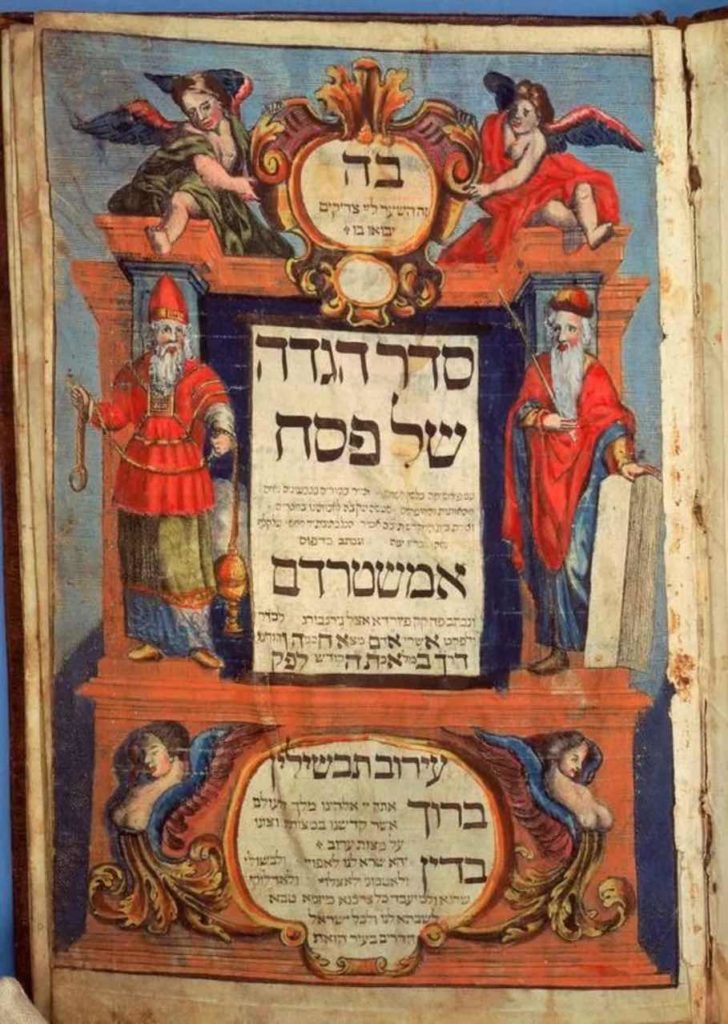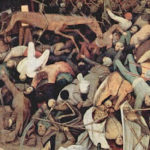
The theme of the torture of the grave is described in the Jewish Encyclopedia under the title Hibbut ha-keber, חבּוּט הקֶּבֶר (‘the beating of the grave’) as “one of the seven modes of judgment or of punishment man undergoes after death, as described in the treatise ‘Ḥibbuṭ ha-Ḳeber’ also known as "Midrash R. Yiẓḥaḳ b. Parnak.”
THE ENCYCLOPEDIA GOES ON to detail how, according to a description given by R. Eliezer (1st cent.) to his disciples,
the Angel of Death places himself upon the grave of a person after burial and strikes him upon the hand, asking him his name; if he cannot tell his name the angel brings back the soul to the body, to be submitted to judgment. For three successive days the Angel of Death, with a chain made half of iron and half of fire, smites off all the members of the body, while his host of messengers replace them in order that the dead may receive more strokes. All parts of the body, especially the eyes, ears, lips, and tongue, receive thus their punishment for the sins they have committed. Greater even than the punishment in hell, says R. Meïr in the name of R. Eliezer, is the punishment of the grave, and neither age nor piety saves man from it; only the doing of benevolent works, the showing of hospitality, the recital of prayer in true devotion, and the acceptance of rebuke in modesty and good-will are a safeguard against it.
We note here that the idea of the torment of the grave is an ancient Haggadah idea with Zoroastrian roots. The meaning of the Haggadah (‘Midrashim on the Haggadah’) includes commentaries and interpretations of the sacred text, or expansions on it with the addition of new myths that not mentioned in the legal texts of the Holy Bible but which are delivered in a preaching or moralising style. Sometimes Haggadah myths are closely related and similar or even correspond to non-canonical (‘apocryphal’) books, such as the Story of Enoch, the Life of Adam and Eve, and the Death of Moses.
The word ‘haggadah’ originally means ‘to inform’, or ‘to narrate’, and in a more specific sense to exaggerate and expand the interpretation of a passage of the Bible, and to create new beliefs and perceptions founded on those erroneous interpretations that take the text in generally unwarranted directions. One might say that the above-mentioned text in the Jewish Encyclopedia under the title Hibbut ha-keber could be considered a hadith text placed there to sow doubt among believers, in which case we could say that it is the hadiths that were attributed to the Prophet that actually confirm the authenticity of this text, since they detail how the Jewess who approached ‘Ā’isha knew about the torment of the grave before ‘Ā’isha did.
It is the revelation of Ka‘b Ibn Māti that has been preferred to the Revelation of Allah
The hadiths that were recorded about the torment of the grave prove the fact that the Jews knew about the torment of the grave before Islam, and before the Prophet of Islam himself knew of it (far be it from God to be thus ignorant, so they must have forged these hadith and attributed them to the Prophet). In Musnad Aḥmad[1] it was narrated from ‘Ā’isha that a Jewess used to serve her, and whenever ‘Ā’isha did her some favour she would say: “May Allah protect you from the torment of the grave!” ‘Ā’isha went on to say:
The Messenger of Allah came into me and I said: “O Messenger of Allah, will there be a punishment in the grave before the Day of Resurrection? He said: “No, why should there be?” She replied: “This Jewess whom we did do some favour, said “May Allah protect you from the torment of the grave!” He replied “The Jews lie, they are the most deceitful people concerning Almighty God! There is no torment other than on the Day of Resurrection”. Then as much time passed as Allah willed should pass, one day the Prophet emerged at midday wrapped in his robe with his eyes reddening, and called out at the top of his voice: “O people, temptation has overtaken you like portions of the dark night. O people, if you knew what I know, you would cry a lot and laugh little. O people, seek refuge in Allah from the torment of the grave, for the torment of the grave is real!”
The chain of transmission for this hadith is sound according to the conditions for verification set down by the two shaykhs al-Bukhārī and Muslim. Therefore, according to this false hadith, the Jews knew the torment of the grave before the Messenger of Allah, even though it was not mentioned in the Torah or in the Bible.[2]
The verse that the hadith narrators most cited to prove the torment of the grave is verse 46 of Sūrat Ghāfir:
The Fire; they are exposed to it morning and evening; and on the day when the Hour upriseth (it is said): Cause Pharaoh’s folk to enter the most awful doom.
But they forget that this verse which, according to their books, is a Makkan verse – that is revealed in Makka – while in fact the Prophet married ‘Ā’isha in Madīna in the second year of the hijra. The commentators of the Qur’ān were alert to this problem, and we see Ibn Kathir referring to this when he says:
But the question arises: this verse was undoubtedly revealed in Makka, but they use it as evidence to prove that there will be torment in the grave during the period of Barzakh. Imam Aḥmad records from ‘Ā’isha that a Jewish woman used to serve her, and whenever ‘Ā’isha did her a favour, the Jewish woman would say: “May Allah save you from the torment of the grave!” `A’isha said, “Then the Messenger of Allah came in, and I said, `O Messenger of Allah, will there be any torment in the grave before the Day of Resurrection?’ He replied, “No, who said that?” I said, `This Jewish woman, whenever I do her a favour, she says: “May Allah save you from the torment of the grave”. The Messenger of Allah said, “The Jews are lying, and they are the ones who tell the most lies about Allah. There is no torment except on the Day of Resurrection.” Then as much time passed as Allah willed should pass, one day the Prophet came out at midday wrapped in his robe with his eyes reddening, and called at the top of his voice: “The grave is like patches of dark night! O people, if you knew what I know, you would weep much and laugh little. O people, seek refuge with Allah from the torment of the grave, for the torment of the grave is real!”
This chain of narration is sound according to the conditions of verification set down by Al-Bukhārī and Muslim, although they did not themselves record it.
Aḥmad tells that Yazid narrated from Sufyān, from al-Zuhrī and from ‘Urwa that ‘Ā’isha said: “A Jewish woman asked her a favour, and she granted that, after which she said to her: “May Allah protect you from the torment of the grave!” ‘Ā’isha found that strange, and when she saw the Prophet she related this to him, and the Messenger of Allah said: “No”. ‘Ā’isha then says: “Afterwards the Messenger of Allah said to us: “It has been revealed to me that you will be tried in your graves”. This is also according to the conditions of verification set down by al-Bukhārī and Muslim. Now some have asked: “How can this report be reconciled with the fact that the verse was revealed in Makka and the verse indicates that there will be torment during the period of Barzakh?” The answer to this is that the verse refers to souls being exposed to the Fire morning and evening during the Barzakh; it does not say that the pain will affect their bodies in the grave. So it may be that this has to do specifically with their souls. And with regard to there being any effect on their bodies in Barzakh and feeling pain as a result, this is only indicated in the Sunna, and in some Hadiths.
That is, he says that the punishment is in the soul only and not in the body according to the verse.

Suggested Reading
When will Muhammad’s nation free itself from its sacralised myths?
In the commentary Ma‘ālim al-Tanzīl by al-Baghāwī, and the commentary on The Great Commentary by al-Ṭabarānī, what is happening in the grave is only a symptom, and not an actual punishment. Al-Baghāwī notes concerning the Qur’ānic passage: they are exposed to it morning and evening, that al-Mas‘ūd had argued the following:
It is the souls of the Pharaoh’s family in the hollows of black birds who are exposed to the fire twice every day. They enter morning and evening into the Fire and it is said to them: “O family of Pharaoh, these are your dwelling-paces until the Hour comes. Al-Qatāda, al-Muqātil, al-Suday and al-Kalbī say: “The soul of every infidel is exposed to the fire every morning and every evening as long as the world lasts.” And it is reported that the Messenger of Allah said: “When one of you dies, he is shown his place in Paradise or Hell morning and evening; if he is destined for Paradise, then he is ‘one of the people of Paradise’, and if he is destined for Hell, then he is ‘one of the people of Hell’. And it will be said to him: “This is your place until Allah resurrects you to go to it on the Day of Resurrection!”
Although this verse is Makkan, the Messenger did not seek refuge from the torment of the grave before the Jewess informed him of this (far be this ignorance from the Messenger of Allah!) “The Messenger of Allah came in to me while I was with a Jewish woman” said ‘Ā’isha. “Did you feel that you were being tormented in the grave?” ‘Ā’isha said: “Then the Messenger of Allah was terrified and said, “It is the Jews who will be tested!” Then the Messenger of Allah said, “Did you feel that it was revealed to me that you will be tormented in the graves?” ‘Ā’isha said: “I heard the Messenger of Allah, afterwards, seeking refuge from the torment of the grave.”[3]
The Sūrat al-Ṣāffāt and Sūrat Āl ‘Imrān both indicate the impossibility of there being any torment of the grave, and this is further confirmed by verse 52 of Sūrat Yā Sīn:
They shall say: O woe to us! who has raised us up from our sleeping-place? This is what the Beneficent Allah promised and the messengers told the truth.
Nevertheless, it is the revelation of Ka‘b Ibn Māti that has been preferred to the Revelation of Allah.
[2] Musnad Aḥmad 24520. Modern commentators explain away the problem of Muḥammad first denying the torment of the grave and then confirming it, by suggesting that the Prophet knew of this torment, but that ‘he believed that the infidels would be tormented, but it had not yet been revealed to him before this incident that the torment of the grave might also affect the monotheists. So the narrative of his denial was recorded, and subsequently the revelation came to him to confirm the matter’. On this, see the fatwā on Islamweb . (Ed.)
[3] Narrated from ‘Ā’isha by Muslim no. 584 and evaluated as ṣaḥīḥ.
Main image: Frontispiece of a German Haggada dating from 1733.
See Part One of this essay here
